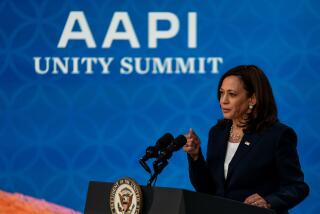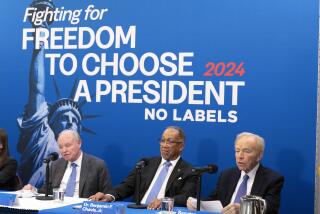Parties Exchange Charges at Hearing on Anti-Asian Bias
WASHINGTON — In a forum set up to air complaints of bias against Asian Americans stemming from the campaign fund-raising controversy, top Democratic and Republican party leaders traded pointed charges of racial insensitivity before the U.S. Commission on Civil Rights on Friday.
Joseph Sandler, the Democratic National Committee’s general counsel, criticized a stinging fund-raising pitch sent out this spring by Sen. Mitch McConnell (R-Ky.) for its “clear racial overtones.” It accused Democrats of taking in money from “Red China, the Russian Mafia, Cuban drug dealers and Asian arms peddlers.”
The National Republican Senatorial Committee declined to attend the commission briefing and instead sent a letter that accused Democrats of making “racially hostile smears” against McConnell, who is chairman of the GOP senatorial reelection group.
Noting that McConnell is married to a Chinese American, Republicans accused Democrats of smearing McConnell’s family during his 1996 reelection campaign by urging voters “to send a real all-American family to represent Kentucky.”
The session was convened by the commission to hear from Asian American leaders, who filed a petition in September charging Congress, political leaders and the media with stereotyping and scapegoating people of Asian descent during the campaign fund-raising scandal.
*
“When . . . white men violate campaign finance rules, they pay a fine and nobody gets hurt. There is no maligning of the entire race,” complained Suzanne Ahn, a Dallas neurologist who said she has been interviewed by the FBI because of her donations to the DNC. “I think there is an incredible double standard here.”
Ahn and other witnesses told the commission--an advisory body formed in 1957 to investigate complaints of racism--that inquiries into the activities of Democratic fund-raisers John Huang, Yah Lin “Charlie” Trie and Johnny Chien Chuen Chung have tainted the entire Asian American community and prompted some to question the loyalties of U.S. citizens and legal permanent residents who are of Asian descent.
Criticizing the DNC for quizzing Asian Americans about their citizenship, Ahn angrily demanded that the party return her contribution, which amounted to $1,000 in 1996.
In an interview, Sandler said the Democratic Party understands “the anger, pain and frustration,” and is working to improve contacts with Asian Americans. Without agreeing to return Ahn’s donation, Sandler said he takes her concerns “very, very seriously.”
Daphne Kwok, executive director of the Organization of Chinese Americans, testified that her group’s membership logs were subpoenaed by the Justice Department, which has created a cloud over the organization in some people’s eyes.
*
Former Los Angeles City Councilman Michael Woo said he was unfairly criticized by two members of Congress because of a letter he wrote that appeared in Huang’s correspondence files. “This controversy and its aftermath marks an immense setback for Asian Americans nationally,” Woo said.
Commission Chairwoman Mary Frances Berry opened the session by saying the assertions were merely allegations and “no determination has been made to the accuracy of these charges.”
But questions by commissioners--appointed by President Clinton and Congress--clearly indicated support for the petition. Berry, a University of Pennsylvania history professor, said there would be some follow-up to the session--perhaps a formal hearing or a public report.
Berry asked Sandler whether the DNC contacted all the Firemans and Kramers after businessman Simon C. Fireman, a fund-raiser for former GOP presidential candidate Bob Dole, and Thomas Kramer, a German national, were heavily fined by federal authorities for making illegal contributions.
Sandler said no donors were scrutinized solely by surname, although he said DNC officials did review contributions taken in by Huang, who oversaw fund-raising in the Asian American community.
But Frank Wu, a Howard University law professor, argued that the DNC did, in effect, target Asian Americans with its audit by quizzing all donors who attended events organized by Huang.
Witnesses ranged from donors who felt personally victimized by the controversy to academics who assessed the historical root of anti-Asian-American bias and journalists who testified about how media outlets have acted irresponsibly.
More to Read
Get the L.A. Times Politics newsletter
Deeply reported insights into legislation, politics and policy from Sacramento, Washington and beyond. In your inbox three times per week.
You may occasionally receive promotional content from the Los Angeles Times.










